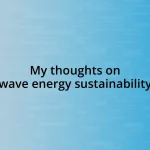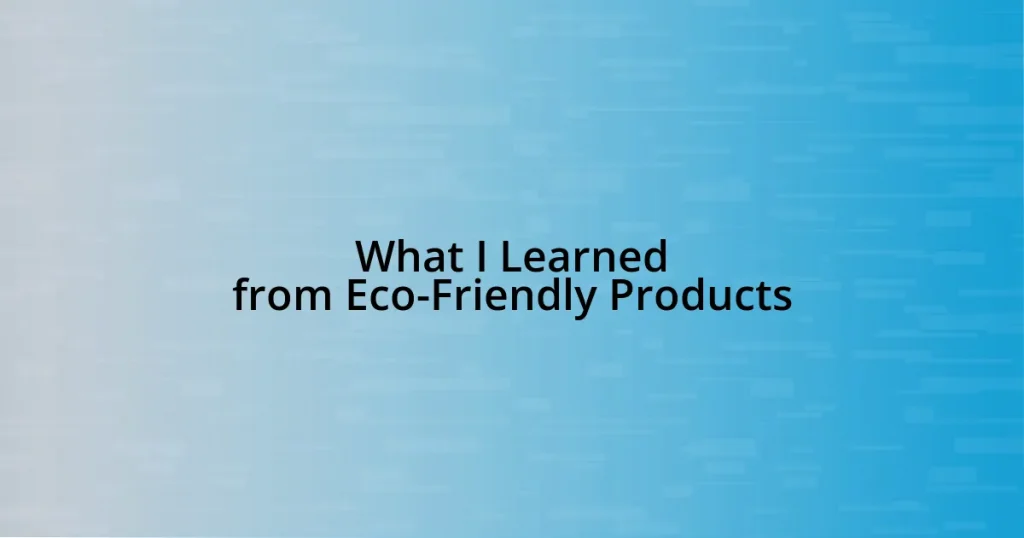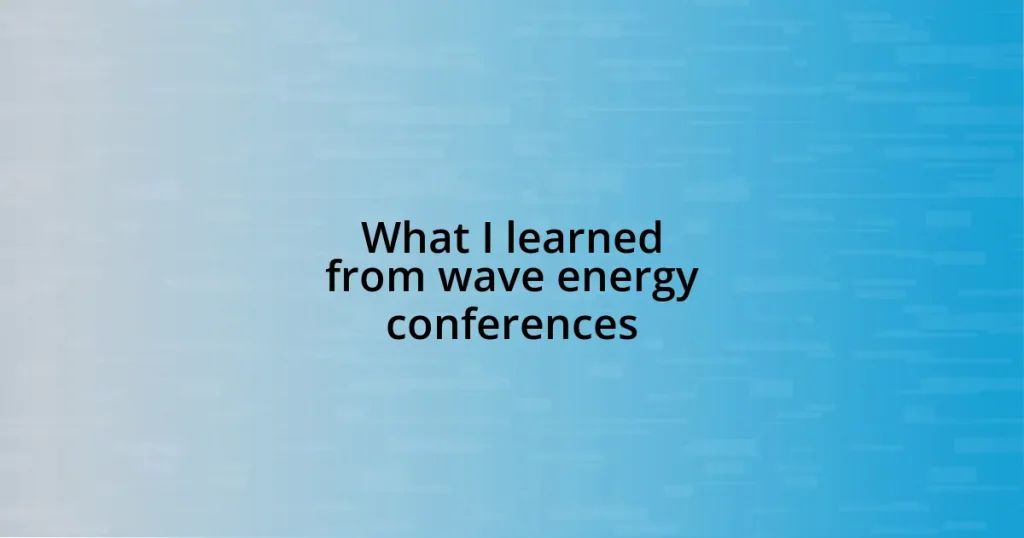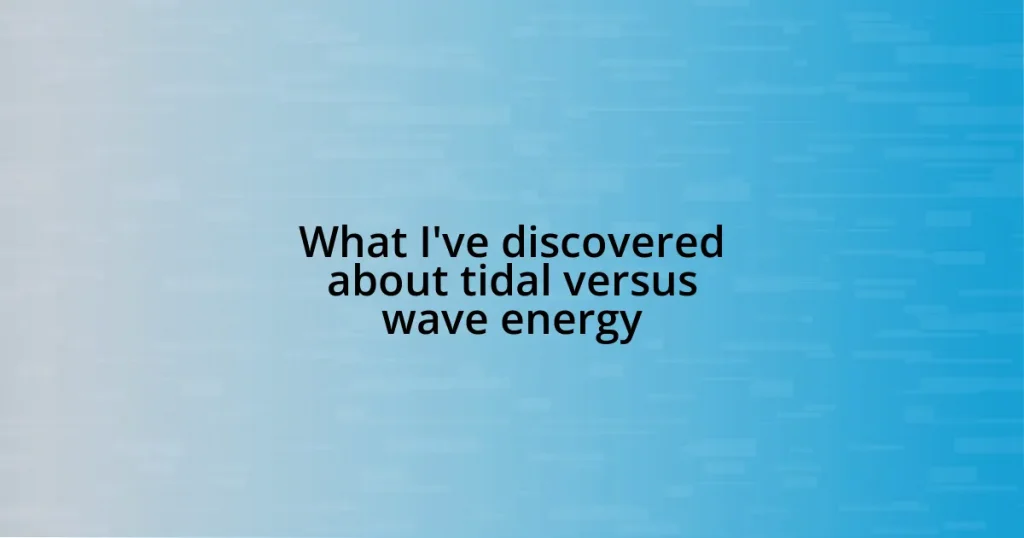Key takeaways:
- Switching to eco-friendly products, like bamboo toothbrushes, fosters mindful habits and highlights the importance of reducing plastic waste.
- Eco-friendly choices enhance personal well-being, often being free from harmful chemicals and promoting ethical practices.
- Understanding materials and certifications, such as Fair Trade and organic labels, empowers consumers to make informed and ethical purchasing decisions.
- Practical shifts, like using biodegradable makeup wipes and reusable beeswax wraps, illustrate how daily choices contribute to sustainability.
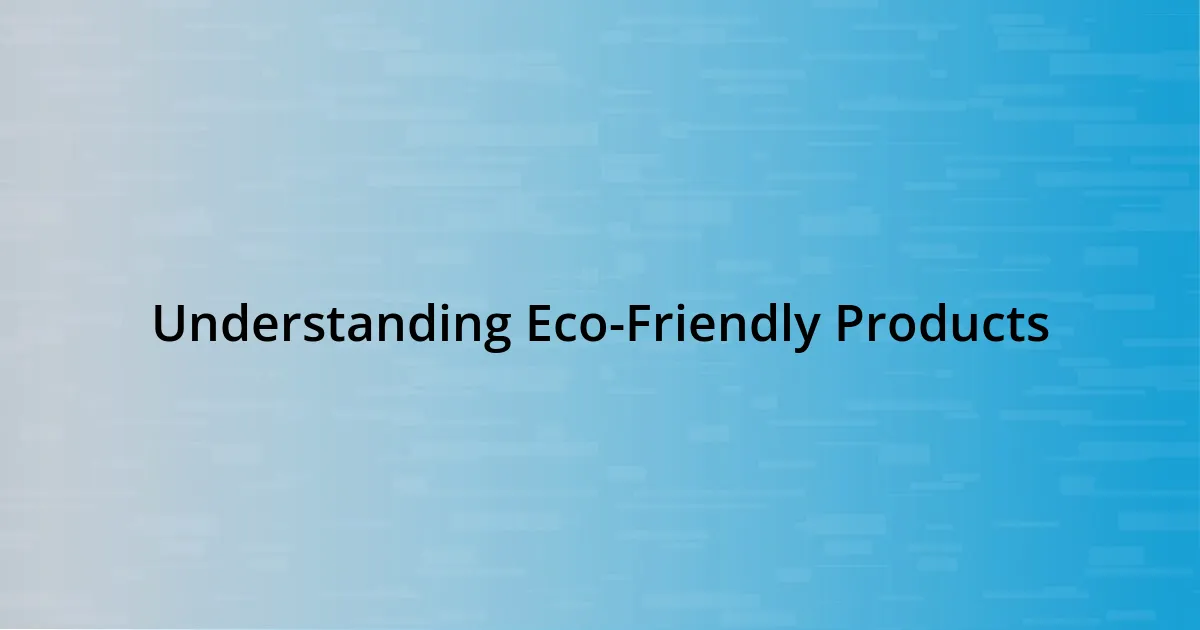
Understanding Eco-Friendly Products
When I first started exploring eco-friendly products, I was amazed at the variety available. From biodegradable cleaning supplies to sustainably sourced clothing, each choice felt like a small step towards making a bigger impact. But have you ever thought about how these products are crafted? It’s fascinating to learn that many are made from natural ingredients that not only reduce environmental harm but also benefit our health.
One experience that stood out for me was when I switched to bamboo toothbrushes. At first, I was skeptical about whether a simple change like this could matter. However, witnessing the shift in my daily routine made me realize how mindful decisions can accumulate over time. Each brush became a reminder of my commitment to less plastic waste.
Interestingly, eco-friendly products often embody a larger philosophy of sustainability. It prompts me to wonder: what other facets of daily life can we improve by aligning our choices with eco-consciousness? Each time I reach for a product labeled as eco-friendly, I feel a sense of connection to the larger community striving for a healthier planet; it’s a humbling and empowering experience.
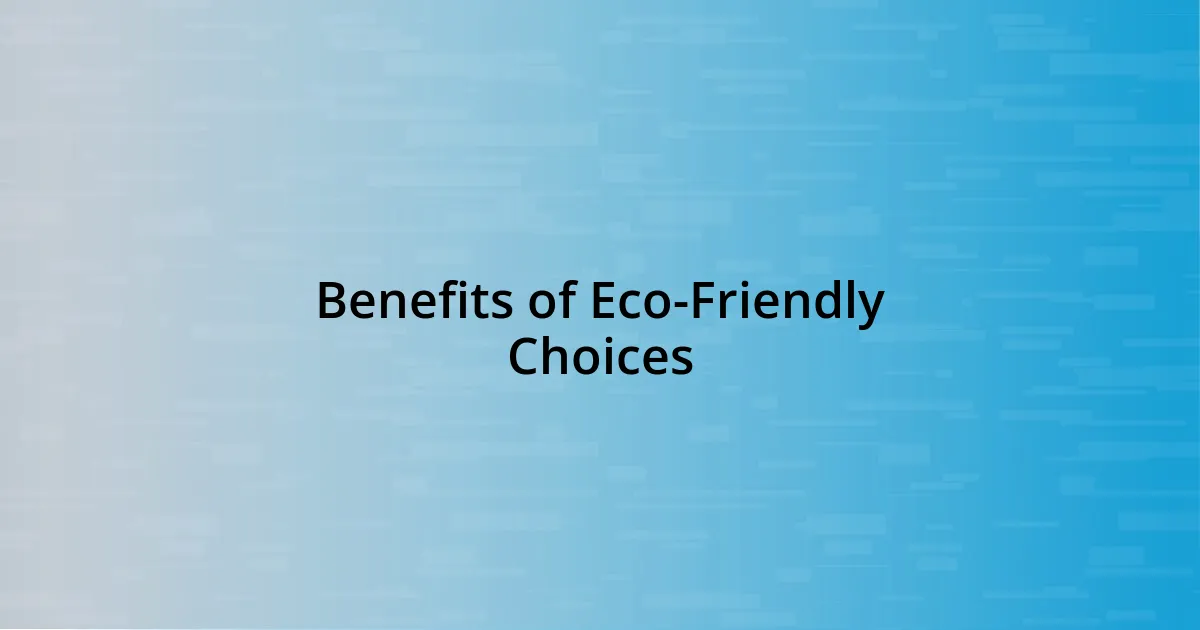
Benefits of Eco-Friendly Choices
Making eco-friendly choices not only benefits the environment but can also improve our well-being. I remember the first time I tried organic skincare products. The soothing feeling on my skin was a pleasant surprise, and I found it comforting to know that I wasn’t exposing myself to harsh chemicals. This personal shift made me more aware of what I put into my body, reinforcing the idea that eco-friendly products often prioritize quality and gentleness over tradition.
Here are some key benefits I discovered:
- Healthier Living: Eco-friendly products are often free from toxic chemicals, reducing the risk of allergies and skin irritations.
- Sustainability: These choices contribute to the conservation of resources and reduce environmental pollution.
- Supporting Ethical Practices: Many eco-friendly brands prioritize fair labor practices, ensuring that their production methods benefit workers.
- Long-Term Savings: Although some eco-friendly products have a higher upfront cost, they often last longer and save money in the long run.
- Emotional Satisfaction: Choosing eco-friendly items can lead to a sense of pride and fulfillment, knowing you’re making a positive impact on the planet.
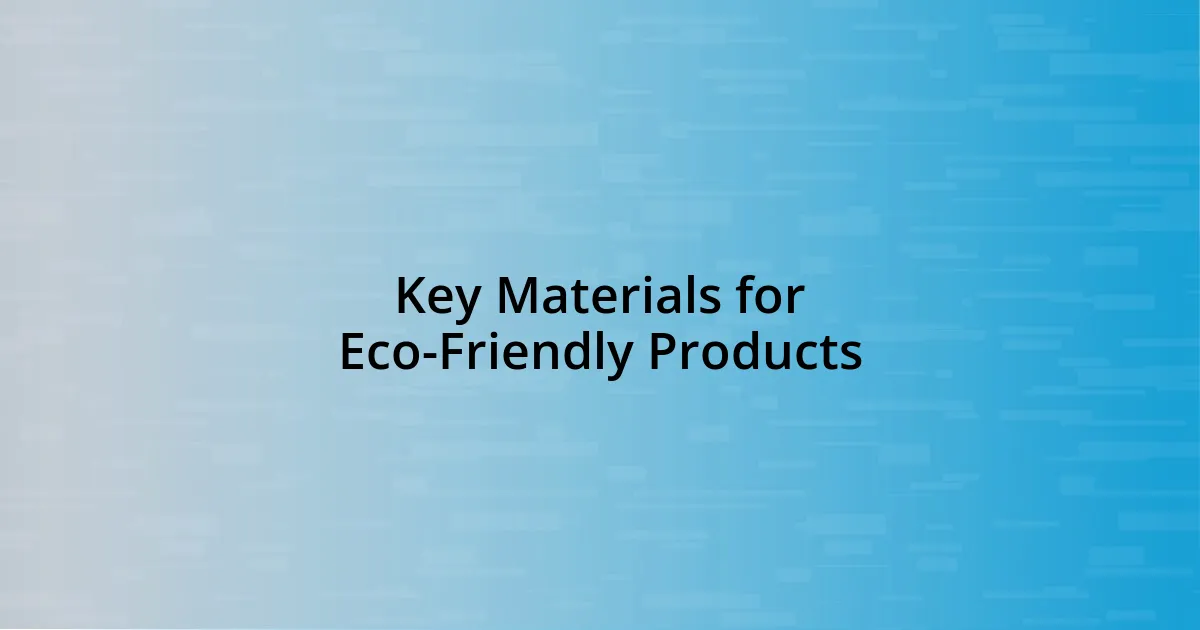
Key Materials for Eco-Friendly Products
When diving into the world of eco-friendly products, the materials used are a vital factor to consider. I remember feeling overwhelmed during my initial research, but eventually, I realized that plant-based materials like hemp and organic cotton were game changers. They not only nourish the environment but also create a much healthier atmosphere in our homes and wardrobes.
As I began to explore packaging options, I found that products utilizing recycled materials truly stood out. For instance, my favorite snack brand transitioned to using compostable packaging. It was a small but powerful change that resonated with me deeply. Every time I finished a bag, I not only enjoyed the snack but was reminded that I was contributing to a more sustainable cycle.
One specific encounter that left an impression on me involved a line of cleaning products that highlighted their use of essential oils, derived from plants. The scent filled my home with a refreshing aroma, enhancing my cleaning routine. I felt reassured knowing that while I cleaned my space, I wasn’t releasing harmful chemicals into the air. This experience opened my eyes to the notion that eco-friendly materials can profoundly impact not just the environment—but our lives as well.
| Material | Benefits |
|---|---|
| Hemp | Highly sustainable, requires few pesticides, biodegradable. |
| Organic Cotton | Free from harmful chemicals, soft on skin, promotes biodiversity. |
| Recycled Materials | Reduces waste, conserves resources, lessens carbon footprint. |
| Essential Oils | Natural scents, beneficial for air quality, non-toxic. |
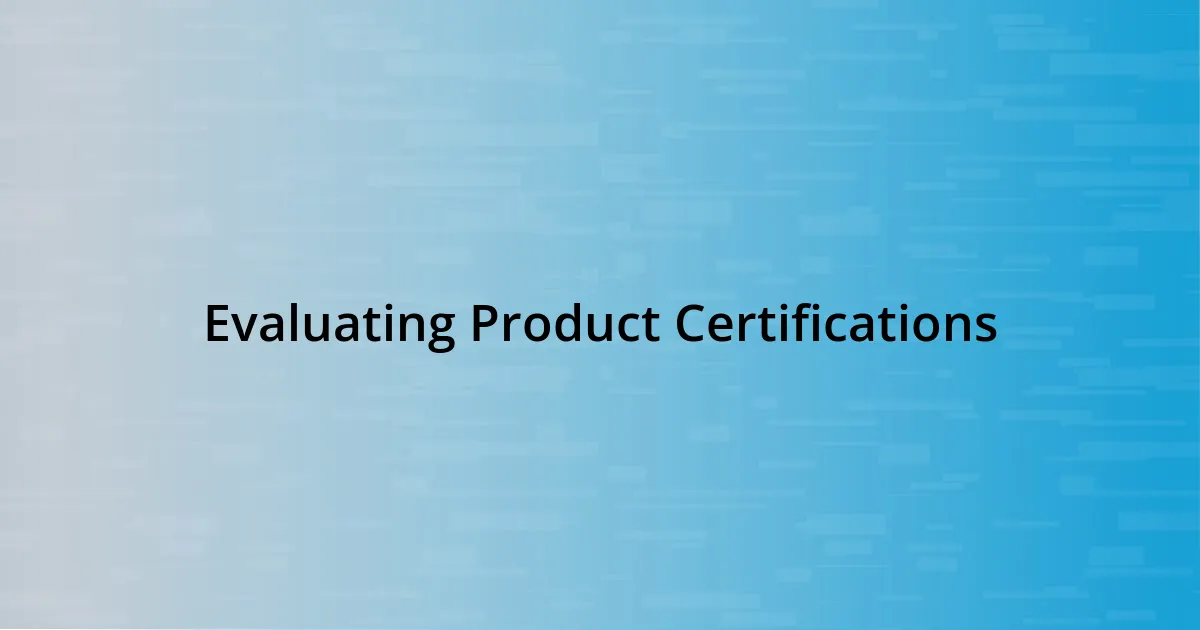
Evaluating Product Certifications
When I first encountered product certifications for eco-friendly items, it felt like discovering a hidden language. It’s easy to feel lost with all the labels out there, like USDA Organic or Energy Star. Each certification tells a story about the product’s journey, and understanding these can feel empowering.
I remember my excitement when I finally figured out how to read these labels. For example, seeing the Fair Trade logo on my coffee made me feel connected to the farmers behind the beans. It wasn’t just a purchase; it was a vote in favor of ethical practices. Have you ever felt that surge of satisfaction from knowing your choices support fair labor?
It’s essential to delve deeper into what each certification actually means. Some are stricter than others, and while greenwashing can be prevalent, recognizing genuine standards can save us from disappointment. I recall researching the differences between “natural” and “organic,” and how the latter signifies higher safety and quality. This knowledge transformed my shopping experience, making it more intentional and fulfilling.
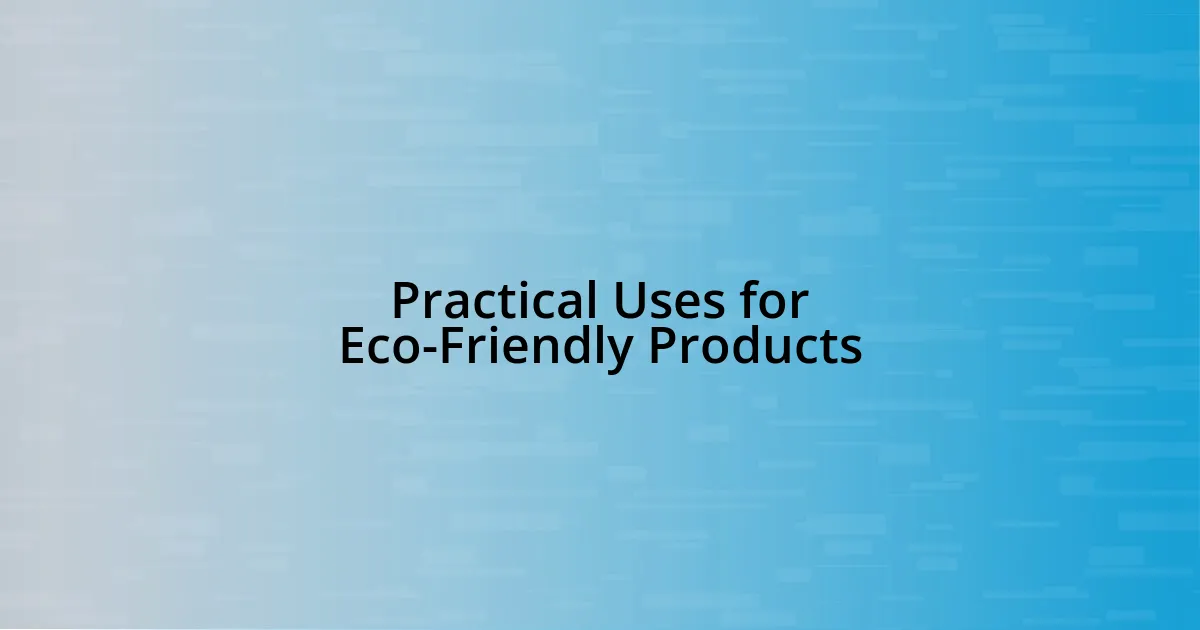
Practical Uses for Eco-Friendly Products
Using eco-friendly products in everyday life can be both fulfilling and practical. I remember the first time I swapped my regular toothbrush for a bamboo one. It felt like a small step, but seeing how much plastic waste I was avoiding deeply resonated with me. Suddenly, a simple act of brushing my teeth became a part of my commitment to the planet.
When it comes to personal care, I have found that using biodegradable makeup wipes is a game changer. Initially, I was skeptical about their effectiveness, but I soon realized that they perform just as well, without the guilt of contributing to landfill waste. Each time I reach for that pack, I feel a sense of pride knowing I’m making a positive choice, which makes my skincare routine feel more intentional.
In the kitchen, choosing reusable beeswax wraps instead of plastic wrap transformed how I store food. I vividly recall the day I wrapped my leftovers for the first time; the bright colors added cheer to my fridge. Plus, I loved that I could simply wash them and use them again! This simple shift not only helps reduce plastic use, but it also adds a touch of sustainability to my culinary adventures. Have you ever paused to think about how your choices, even in food storage, echo a larger commitment to eco-friendliness?





